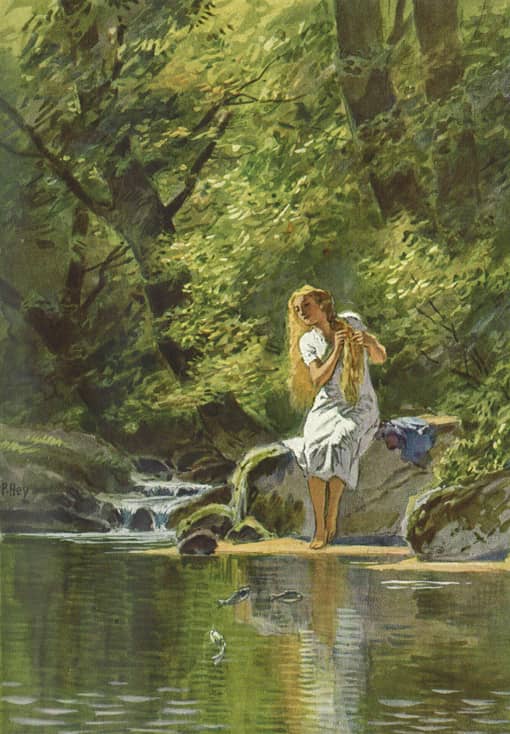meditation 109

न मे बन्धो न मोक्षो मे भीतस्यैता विभीषिकाः
।प्रतिबिम्बम् इदम् बुद्धेर् जलेष्व् इव विवस्वतः॥ १३५॥
na me bandho na mokṣo me bhītasyaitā vibhīṣikāḥ |
pratibimbam idam buddher jaleṣv iva vivasvataḥ || 135 ||
Liberation and bondage
are merely reflections in one's consciousness —
like the reflection of the sun in water.
These words —
(liberation and bondage) —
are there to terrify
the ignorant.
I [Bhairava] am really neither
bound
nor free.
*
Editor's Note:
Although reflections of sunlight or moonlight on water may be calming, this verse is about vikalpas, the binary structures our thoughts assume. Even when we talk about ultimate reality, we must do so using language, and thus deep-seated binary structures.
Structural anthropology holds a similar view.
Swamiji and Panditji's 1974 – 1975 translation reads as follows:
Liberation and bondage are merely reflections in one's consciousness, like the reflection of sun in water. These words (liberation and bondage) are there to terrify the ignorant. I am really neither bound nor free.
Sometimes, translations have the ability to breathe new life into a text by offering fresh perspectives and richer interpretations. While the Sanskrit original holds its own beauty and depth, translation can make the concepts more accessible and relatable to a wider and more broadly educated readership. It can be, in effect, playfully inter-reflective.
The reflection metaphor, the translation's inverted structure, and the verse's emphasis on the illusory nature of the concepts of bondage and liberation all contribute to a compelling philosophical and literary whole, with the essence of the original preserved and even enhanced.
Swamiji and Panditji's translation serves as a veritable Indra's Net of interreflections. It is delightful to see that although the Sanskrit original of the verse begins with the six words na me bando na mokṣo me (I am neither bound nor free), Swamiji and Punditji's translation playfully inverts the placement of these first six words from the opening to the closing of the verse.
Thus, the Sanskrit and English playfully inter-reflect one another, as do the images of bondage and liberation, bound and free, within each of the three stanzas of Swamiji and Punditji's translation.
Swamiji and Panditji playfully open with the words "liberation and bondage," inverting the syntactic order of bound and free of the original Sanskrit, while substituting nouns for adjectives and the correlative conjunction nor for the coordinating conjunction and.
All of this mirrors, of course, the truth that images of the sun appear inverted in the myriad bodies of water they are reflected within.
When translators deeply understand the essence of a text and can convey it in a way that resonates with a new audience, it can result in a version that some might even find more compelling than the original.
Swamiji deeply understood the text, and Panditji, with his mastery of English, shared common linguistic terrain with English-speaking readers worldwide.
In this way, their translation bridges cultural and linguistic gaps, offering fresh perspectives and interpretations that actually enhance the original.

We should not be surprised, then, when we find that, Singh and Lakshmanjoo's notes on the verse reflect those of Abhinavagupta.
Also, Kashmir itself lies on a tributary of the ancient Silk Road, so we should not find it surprising that preeminent Song dynasty Neo-Confucian Chu Hsi (Zhu Xi; 1130 – 1200), employed a similar simile to mirror a similar point: that ultimately, for the Metaphysical person, the Supreme Ultimate, though found in all things, is not cut up into pieces. Rather, it is like the one moon's reflection in ten thousand streams. Whereas for the Non-Metaphysical person, it is not.
Chu Hsi, in turn, is said to have borrowed the image from 7th-century Hua Yen Buddhism. The image itself, however, reflects back all the way to the appearance of Indra's Net in the Atharva Veda.
According to Hua Yen Buddhism, Indra's net is infinite, with infinite interstices, and with each one nesting a jewel reflecting all the images within all the jewels, including itself.
In this form of Buddhism, the image served as a metaphor for the doctrines of interdependent origination and emptiness.
Leibniz, in turn, knew his Chu Hsi, and his system reflects Chu's—as well as those of some Buddhisms: another case of Silk Road contagion.
In this verse, the scripture veers into the use of apophatic rhetoric (i.e., I am neither bound nor free) to seem more relevant to the collapse of conventional logic and semantics that takes place when words are confronted with the impossibility of saying the unsayable, signifying the unsignafiable.
Whereas Lakshmanjoo and Hughes as well as Lakshmanjoo and Muju enumerates this 109th dhāraṇā as Verse 135 of the scripture, Singh enumerates it as Verse 134.
Swami Lakshmanjoo classifies this way as Shakta-upaya, or the method of Energy.
An aside:

Laura Makabresku's photographic image was inspired by the Hans Christian Andersen tale The Wild Swans (De Vilde Svaner).
The story tells of a golden-tressed maiden whose brothers had been transformed into swans.
The maiden set forth to rescue them.

One morning . . .
when she awoke, the sun was high in the heavens; yet she could not see it, for the lofty trees spread their branches thickly over her head; but like a golden mist, here and there, its beams were glancing through the leaves.
There was a sweet fragrance from the fresh green verdure, and the birds almost perched upon her shoulders. She heard water rippling from a number of springs, all flowing into a lake with golden sands.
Bushes grew thickly round the lake, and at one spot a deer had made an opening, through which Eliza went down to the water.
The lake was so clear that, had not the wind rustled the branches of the trees and the bushes, so that they moved, they would have appeared as if painted in the depths of the lake; for every leaf was reflected in the water, whether it stood in the shade or the sunshine . . .
